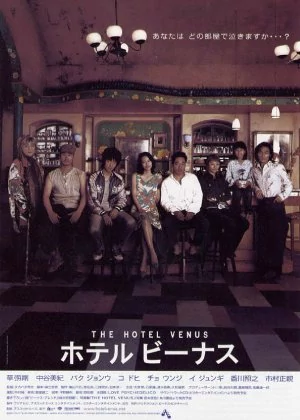The Hotel Venus

Some films are destined to be forgotten, others have everything going for them until their actual release and still end up making any ripples at all. Hideta Takahata's The Hotel Venus [Hoteru Bînasu] is an artsy flick that was lucky enough to get an English-friendly release back in 2004. Despite all those advantages, very few people actually watched The Hotel Venus, and it never really became part of the conversation. I remember liking it a lot though, so I was quite eager to give this one another shot. I was feeling none the wiser the second time around, as it won me over again easily.
![screencap of The Hotel Venus [Hoteru Bînasu]](/thumbs/img/articles/1200xauto/hotel-venus-1.webp)
While not a 100% fit, The Venus Hotel feels part of a string of films (like Go or Blood and Bones) that deal with the discrimination South Koreans face when moving to Japan. The film isn't as explicit as many of its peers, but since we're dealing with a hotel that acts as a refuge for people down on their luck, and many, if not most of the characters speak Korean, there's at least a link there. I wouldn't say it's the main theme, for that, it's too much of a character drama that focuses on several of the individuals living in the hotel, but it's no doubt part of the film's DNA.
The Hotel Venus could've been a pretty straightforward film, but Takahata did his best to inject a little extra intrigue. The city where this film takes place is nondescript (and looked rather European to me, even though all the main characters are Asian). Then there's the monochrome cinematography, not quite black-and-white, but heavily desaturated. It creates a kind of dreamlike setting where wandering people end up as they've fled their past lives. These elements may sound minor (and in some way they are), but in the end, they give this film its unique flair.
Venus runs a little hotel where people with no prospects can stay until they rediscover their purpose in life. One day a man and a young girl arrive at the hotel. They utter the secret password and become its latest residents. No direct questions are asked, but through interactions with the other residents, they slowly open up and begin to share details of their past. Like the other people staying in the hotel, they are running away from traumas that have defined their lives. The healing process is slow, but nobody stays at the hotel forever.
![screencap of The Hotel Venus [Hoteru Bînasu]](/thumbs/img/articles/1200xauto/hotel-venus-2.webp)
The cinematography is no doubt one of the most notable elements of the film. A monochrome look is the quickest way to add a bit of extra visual flair, but the stark use of lightening, the various variations of monochrome (with the flashbacks sporting stronger blue hues), and the ending in color (not the most original choice, but it's a classic for a reason) are all very effective. It's a shame no high-quality version exists just yet, as this film definitely deserves a thorough visual cleanup. But even without one, it's abundantly clear this is a beautiful-looking film.
The soundtrack on the other hand isn't on the same level. Kudos to Takahata for trying something a little different, but the music doesn't always appear to be in line with the vibe of the film. The problem is that the most common motives seem to be the worst offenders, in particular some Korean pop ballads that just don't seem to fit. Maybe they tried to go for a Kar Wai-like effect, but in this case, it detracts from the mood. Not all the pairings are bad though and I don't want to be too harsh on someone trying to do something different with the music, the risk simply didn't pay off in this case.
Luckily the cast is all round strong, sporting some renowned actors who all deliver memorable parts. Teruyuki Kagawa and Miki Nakatani were my favorites, but Tsuyoshi Kusanago and Jung-Woo Park are also pretty great. They all help to bring extra layers to their characters, even when their dialogue is limited (or at times, a little elaborate and forced). The secondary parts are solid too, with a remarkable appearance by Masachuka Ishimura as the titular Venus. You don't often see a mix of Japanese and South Korean talents in a single film, but The Venus Hotel is proof it can work.
![screencap of The Hotel Venus [Hoteru Bînasu]](/thumbs/img/articles/1200xauto/hotel-venus-3.webp)
Even though the film starts when a man and his daughter arrive at the hotel, this film isn't just about them. They are used as a vehicle to introduce the audience to this wonderful little place, where various people are enjoying a time-out from life. The film grants each of them the proper time and respect, while slowly introducing a new plot that carries things through until the end. The finale is probably a bit too neat and convenient and a slightly more nuanced ending might've been a better fit, but it's not so bad that it invalidates all the good that came before.
Looking back at the film, all the elements are here for a modest international arthouse hit, but that never came to be. I wouldn't be surprised that in 10 or 20 years, when we're all reevaluating the 00s, this film gets a second chance to win people over. It certainly deserves it. The mysterious setup, the stylish cinematography, and the solid performances all contribute to a lovely drama that neatly balances genre and arthouse elements. It's an easy recommendation if you love that particular cross-over, but it's probably not the right time to push this film.